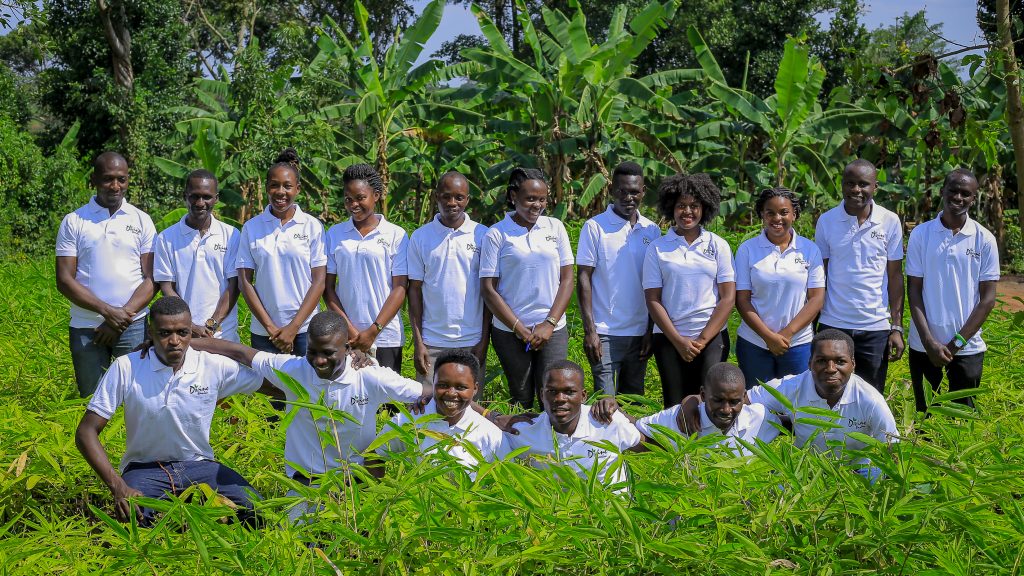The team: Divine Bamboo has expanded quickly since its launch in 2016. Image: Divine Bamboo.
Uganda-based company Divine Bamboo has a clear vision: “an Africa with zero deforestation and increased access to renewable energy.” Established in 2016, Divine Bamboo uses local bamboo to create charcoal briquettes, as a renewable alternative to traditional cooking fuels. The company has already made a name for itself in the biomass energy sector, as one of the largest producers of bamboo seedlings in Uganda, and a strong voice for promoting bamboo energy.
In 2020, Divine Bamboo won the prestigious Energy Access Booster Award, which recognises energy access entrepreneurs operating in Africa or Asia. INBAR interviewed its CEO, Divine Nabaweesi (pictured above).
Congratulations on Divine Bamboo’s award. Are people in Uganda surprised by bamboo charcoal? Is there any scepticism or reluctance to use it?
There is still a lot of scepticism regarding bamboo and its benefits in Uganda, because the bamboo industry is still nascent. People are always surprised when we teach them about the many uses and benefits of bamboo. That is why we continue to conduct training for small-scale farmers and show them all the wonderful uses of bamboo. After the training, we have noticed that farmers start to come to our farm voluntarily and ask for seedlings to plant bamboo on their own land. In the last season, we distributed 2000 seedlings free of charge.
There is definitely still a lot of curiosity surrounding bamboo charcoal, but once people prove that it gives them a cost saving and cooks cleaner, they are eager to switch!
In the SE4ALL article about your award, it was mentioned that “Divine Bamboo’s product has the potential to reduce household fuel expenditure by 50 percent compared to traditional charcoal.” Can you explain how?
This assertion was based on the fact that at the moment, a 50-kilo sack of charcoal in Kampala sells for USD 27, while a 50-kilo sack of bamboo charcoal briquettes [created from waste] will sell for USD 13.50. This, coupled with the fact that bamboo briquettes cook for longer, creates a desperately needed economic saving for families.
Divine Bamboo has come very far in a very short time. What are Divine Bamboo’s plans for the future?
Our goal for the next two years [2020-2021] is to establish 200 hectares of bamboo plantations, to increase the holding capacity of our nursery to one million seedlings a year, to increase production capacity of briquettes to 20 tonnes a month [by 2021] and to train 1000 farmers.
In 2020, Divine Bamboo has also donated one tonne of bamboo charcoal to Uganda’s COVID-19 Task Force.
“Bamboo has immense potential as part of the clean cooking transition. Small-scale farmers in Uganda… own about 7.5 million hectares of land”
Divine Bamboo applied for the Energy Access Booster award so that it can reach commercial scale for producing its briquettes. What are your plans with the money?
Our plan is to immediately increase production of bamboo briquettes to 4 tonnes a month in 2020 and to create a marketing and awareness campaign about the benefits of bamboo charcoal and briquettes.
You are clearly very passionate about improving access to clean energy in Uganda. Do you think bamboo charcoal could be a realistic solution in Uganda’s energy future, for the c. 40 million people who currently don’t have access to clean cooking fuels? How about other countries in the region?
I am very hopeful about the future of bamboo in Uganda and I believe that bamboo has immense potential as part of the clean cooking transition. One way to achieve this is to work with the 3 million small-scale farmers in Uganda who, according to Food and Agricultural Organization of the United Nations, own about 7.5 million hectares of land. This would ensure availability of raw material for the production of bamboo briquettes and other products like furniture, textiles, pulp and paper. Bamboo is an indigenous plant in Kenya, Tanzania and Sudan; therefore, there is great potential for the development of the bamboo industry in the region.
You can find out more about Divine Bamboo at their website, www.divinebamboo.com, or by following them on Twitter and Facebook: @DivineBamboo.
INBAR promotes the use of bamboo and rattan for achieving a number of the UN Sustainable Development Goals (SDGs), including SDG 7: access to affordable and clean energy. For more information about bamboo biomass energy’s contributions to SDG 7, read here.
Divine Bamboo was closely involved in the INBAR-led Dutch-Sino-East Africa Bamboo Development Programme, which ran from 2016 to 2019. Find out more about INBAR’s ongoing project work here.
Forest Machine Magazine is written and edited by a forest professional with over 40 years hands on experience. We are dedicated to keeping you informed with all the latest news, views and reviews from our industry.
To support us you can subscribe to our bi-monthly magazine which is delivered to your door from only £30 per year.
Subscribe here


[…] READ MORE: Plant Power: Bamboo Biomass in Uganda […]